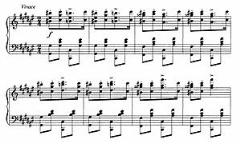Harvey Lavan Cliburn Jr., R.I.P
Harvey Lavan (“Van”) Cliburn, a classical pianist who has been world famous since 1958, died on February 27th of this year. We at JustSheetMusic bid him a fond farewell.
Cliburn was in a direct chain of succession from the 19th century master Franz Liszt, a chain with only two intermediate links. Van’s mother, Rildia Bee (nee O’Bryan) Cliburn, had been a student of Arthur Friedheim, who had been a student of Liszt. Rildia herself was a piano teacher, and when her boy Van was just three years old, she caught him at the keyboard mimicking one of her students with astonishing success. His own lessons began then.
Though Van’s earliest years were spent in Louisiana, the Cliburns moved to Texas when he was only six, and it was with the Houston Symphony that he first performed in public, at the ripe old age of 12.
 At Julliard School, in New York, in the early 1950s, Cliburn studied under Rosina Lhévinne, herself an inspiring example of the Russian pianistic tradition, and of the errors inherent in age discrimination (along with her teaching duties at Julliard, she was just beginning a solo performing career of her own around the time Cliburn showed up in her class – though she was in her 70s.)
At Julliard School, in New York, in the early 1950s, Cliburn studied under Rosina Lhévinne, herself an inspiring example of the Russian pianistic tradition, and of the errors inherent in age discrimination (along with her teaching duties at Julliard, she was just beginning a solo performing career of her own around the time Cliburn showed up in her class – though she was in her 70s.)
After Sputnik
Soon after the Soviet Union sent up the first Sputnik, it announced a new international piano contest, the Tchaikovsky International Piano Competition. Inviting pianists from around the world, the designers of the contest expected that a Russian would win, thus allowing the USSR to showcase its cultural superiority so soon after making such a big show of its technological prowess.
Cliburn arrived in Moscow and rather immediately defied the stereotypes of an American capitalist philistine. Heck, he was actually from Texas, and might have been expected to show some cowboy swagger! But he was a soft-spoken, unassuming young man devoted to, and plainly gifted at, music.
“He looked and played like some sort of angel,” a Russian pianist later recalled.

Sergei Rachmaninov
Fortunately, through the magic of YouTube we have available the performances that won the hearts of the Russians, and may in some part have mitigated the severity of the Cold War at its worst. Here. What you’re listening to there is Sergei Rachmaninov’s 3d Concerto in D Minor. And here, for purposes of comparison, is how Rachmaninov himself played Rachmaninov!
Cliburn didn’t just play Rachmaninoff at the contest; he also played the Piano Concerto No.1 of Tchaikovsky, the man after whom of course the contest had been named.
Loving Russia
Cliburn loved Russia, returning the affection he encountered there, and he returned to that country often. In a 1962 visit, for example, he played thus.
 During that trip too, after Van had completed a triumphant recital and while the audience demanded an encore, Van urged his mother, Rildia, to come out from the wings of the stage to play two numbers herself: she played the Liszt Hungarian Rhapsody No. 2 and an étude by Moszkowski. As The New Yorker noted, “She blew the lid right off the place.”
During that trip too, after Van had completed a triumphant recital and while the audience demanded an encore, Van urged his mother, Rildia, to come out from the wings of the stage to play two numbers herself: she played the Liszt Hungarian Rhapsody No. 2 and an étude by Moszkowski. As The New Yorker noted, “She blew the lid right off the place.”

Nikita Khrushchev
But to return to 1958 and our story: after Cliburn’s performance, the judges wondered how they couldn’t give him the prize, especially after the audience awarded him an eight-minute standing ovation, rather confirming the judges in their own impressions. The story usually told is that the judges, nervous about the political implications, asked Nikita Khrushchev personally what they should do.
Khrushchev answered the question with a question: “Is he the best? … then give him the prize!”
And so they did. For a moment, the Cold War seemed to have faded away.
A Level Head
Of course, politics is not driven by warm fuzzy feelings, and the Cold War hadn’t faded for long. Still, it was a memorable moment, and got Cliburn a ticker-tape parade in New York City, a photo on the cover of Time, and a degree of worldwide adulation seldom bestowed on classical musicians.

Igor Stravinsky
To his credit, Van Cliburn seems to have kept a level and un-swelled head. At the World’s Fair in New York in 1962, Cliburn was half of a double bill with the famous composer Igor Stravinsky. The program had Cliburn opening; then after an intermission, it had Stravinsky conducting an orchestral performance of one of his most best-loved compositions, The Firebird. Remarkably, Cliburn insisted on carrying the bags of the older gentleman to their dressing room area.
Also in 1962, a group of music teachers in Fort Worth, Texas created the Van Cliburn International Piano Competition. The first two contests under this name took place in 1962 and 1966. With the third, though, the organizers initiated the practice, followed ever since, of holding the contest on the odd-numbered year of a U.S. President’s inauguration: thus, 1969, 1973, 1981 and so forth at fourth year intervals until the present. Cliburn happily accepted a role as the director of the Van Cliburn Foundation, the funding entity behind this competition, and he remained involved until his death.
A Legacy
The 2013 contest is scheduled for late May and early June. The sponsors of this competition have posted a touching memoriam to their namesake and inspiration at their website.

Nobuyuki-Tsujii
The last such competition, in 2009, produced a rare result, a tie. The judges bestowed the gold medal on both Nobuyuki Tsujii (portrayed right) and Haochen Zhang. [Click on those names to listen to each.] Nobuyuki has a fascinating backstory: he has been blind from birth.
Documentary filmmaker Peter Rosen produced a movie about Nobuyuki, about that contest and the “Nobu fever” that followed in Japan, called: A Surprise in Texas.
The silver medal in 2009 went to Yeol Eum Son, a South Korean. To bring ourselves full circle we have only to mention that two years later, Son won the … 14th International Tchaikovsky Competition in Moscow. The success of these three fine young musicians has become part of Van Cliburn’s unfolding legacy.
Here’s a fun way to end our own tribute: Van Cliburn on the television program What’s My Line.
He’s Got Them Fooled


